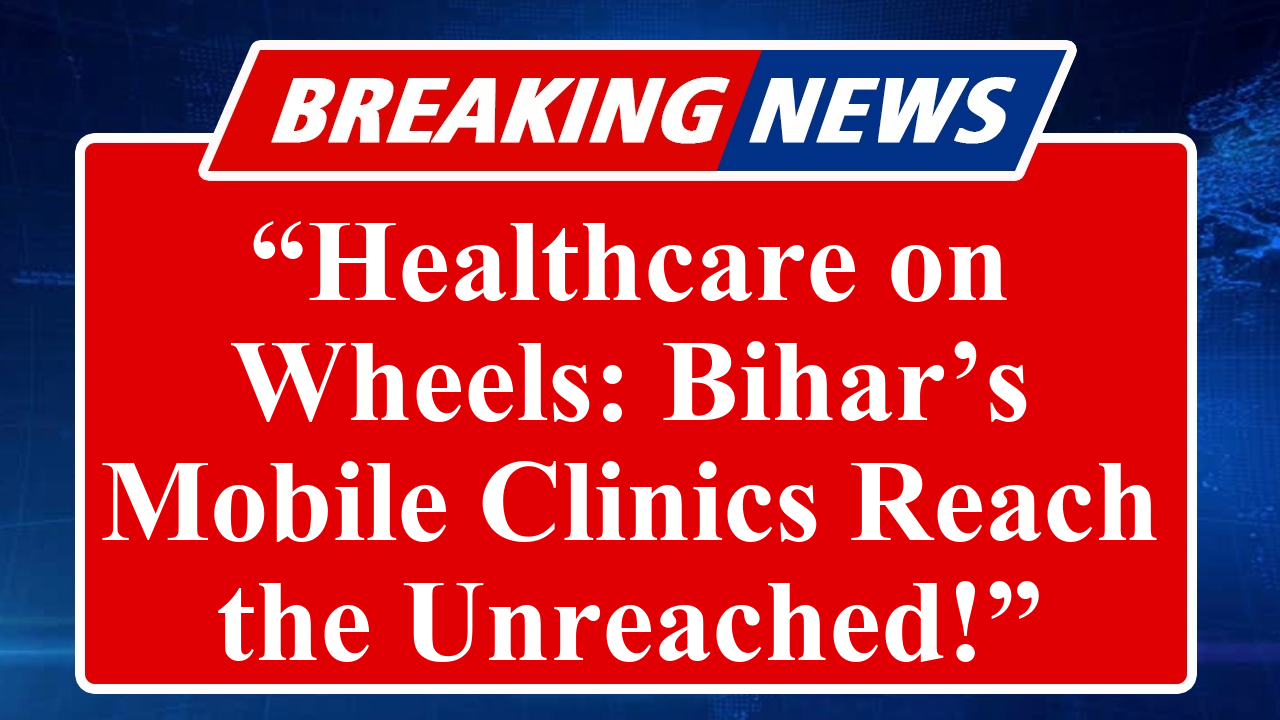Bihar’s new mobile clinics, launched on 29 June 2025, aim to bridge healthcare gaps in remote areas, offering maternal, child health, and diagnostic services. Equipped with advanced medical tools, these clinics target underserved regions, reducing mortality rates and improving access. The initiative, backed by the State Health Society, builds on Bihar’s ongoing healthcare reforms to ensure equitable care for all.
Bihar Rolls Out Mobile Clinics to Transform Rural Healthcare
On 29 June 2025, Bihar’s State Health Society launched a fleet of advanced mobile clinics to deliver critical healthcare services to remote and underserved villages across the state. This ambitious initiative, part of the National Health Mission (NHM), addresses longstanding challenges in Bihar’s healthcare system, including limited infrastructure and access to medical facilities in rural areas. The mobile clinics are designed to provide maternal, newborn, and child health services, alongside diagnostics and preventive care, directly to communities that have historically lacked adequate healthcare access.
Each mobile clinic is equipped with state-of-the-art medical equipment, including portable ultrasound machines, diagnostic kits for communicable diseases, and telemedicine capabilities for real-time consultations with specialists. Staffed by trained doctors, nurses, and community health workers like ASHAs (Accredited Social Health Activists), these clinics aim to serve over 1,000 remote villages in the first phase, covering districts such as Supaul, Madhubani, and Kaimur, where healthcare facilities are sparse.
Bihar, with a population exceeding 128 million as of 2023, faces significant healthcare challenges, including high maternal and infant mortality rates and widespread malnutrition. According to data from the National Family Health Survey (NFHS-5), Bihar’s infant mortality rate stands at 46.8 per 1,000 live births, among the highest in India. The mobile clinics are a strategic response to these issues, building on earlier programs like the Ananya initiative (2011-2013), which piloted health interventions in eight districts before statewide scale-up.
The initiative also integrates modern technology, with IoT-enabled devices for real-time health monitoring and AI-driven analytics to predict and prevent disease outbreaks. These advancements, as outlined in a recent ResearchGate study, could revolutionize healthcare delivery in Bihar by improving accessibility and efficiency. For instance, wearable sensors and cloud-based systems allow health workers to monitor patients remotely, ensuring timely interventions in areas with poor road connectivity.
The State Health Society has partnered with organizations like CARE India and the Bihar Voluntary Health Association (BVHA) to ensure the clinics’ operational success. These partnerships leverage the expertise of frontline health workers who, like ASHA worker Manju, have long served rural communities by providing in-home counseling and basic health services. The mobile clinics aim to amplify their impact by bringing advanced care closer to these workers’ outreach areas.
Additionally, the initiative aligns with the National Rural Health Mission’s goals, launched in 2005, to provide accessible and affordable healthcare to vulnerable populations. The government has allocated funds to ensure the clinics are sustainable, with plans to expand the fleet to 100 units by 2027. Tenders for advanced medical equipment and human resources, such as physiotherapists and X-ray technicians, have already been issued to support this expansion.
Local residents have welcomed the initiative. In Supaul, 45-year-old farmer Ram Prasad shared, “We had to travel 30 kilometers to the nearest hospital, often on bad roads. Now, the clinic comes to us, and my wife can get her check-up without losing a day’s work.” Similar sentiments echo across other districts, where long distances and poor infrastructure have historically limited healthcare access.
The mobile clinics also address specific health challenges, such as tuberculosis (TB) screening and maternal care, through specialized services like ultraportable digital X-ray machines and tele-ECG systems. These efforts build on Bihar’s recent healthcare advancements, including the establishment of new medical colleges and the strengthening of primary health centers, as noted in a 2023 Hospaccx report.
While the initiative is promising, challenges remain. Experts highlight the need for robust technological infrastructure, data security, and integration with existing healthcare frameworks to ensure long-term success. The ResearchGate study emphasizes addressing data privacy concerns and improving interoperability to maximize the impact of IoT-based systems.
As Bihar continues its healthcare transformation, the mobile clinics mark a significant step toward equitable care, bringing hope to millions in its remotest corners.
Disclaimer: This article is based on reports and information available from credible sources, including the State Health Society, Bihar, CARE India, and recent studies on healthcare advancements. Data points are sourced from publicly available documents and may be subject to updates. Readers are advised to verify details through official channels.

